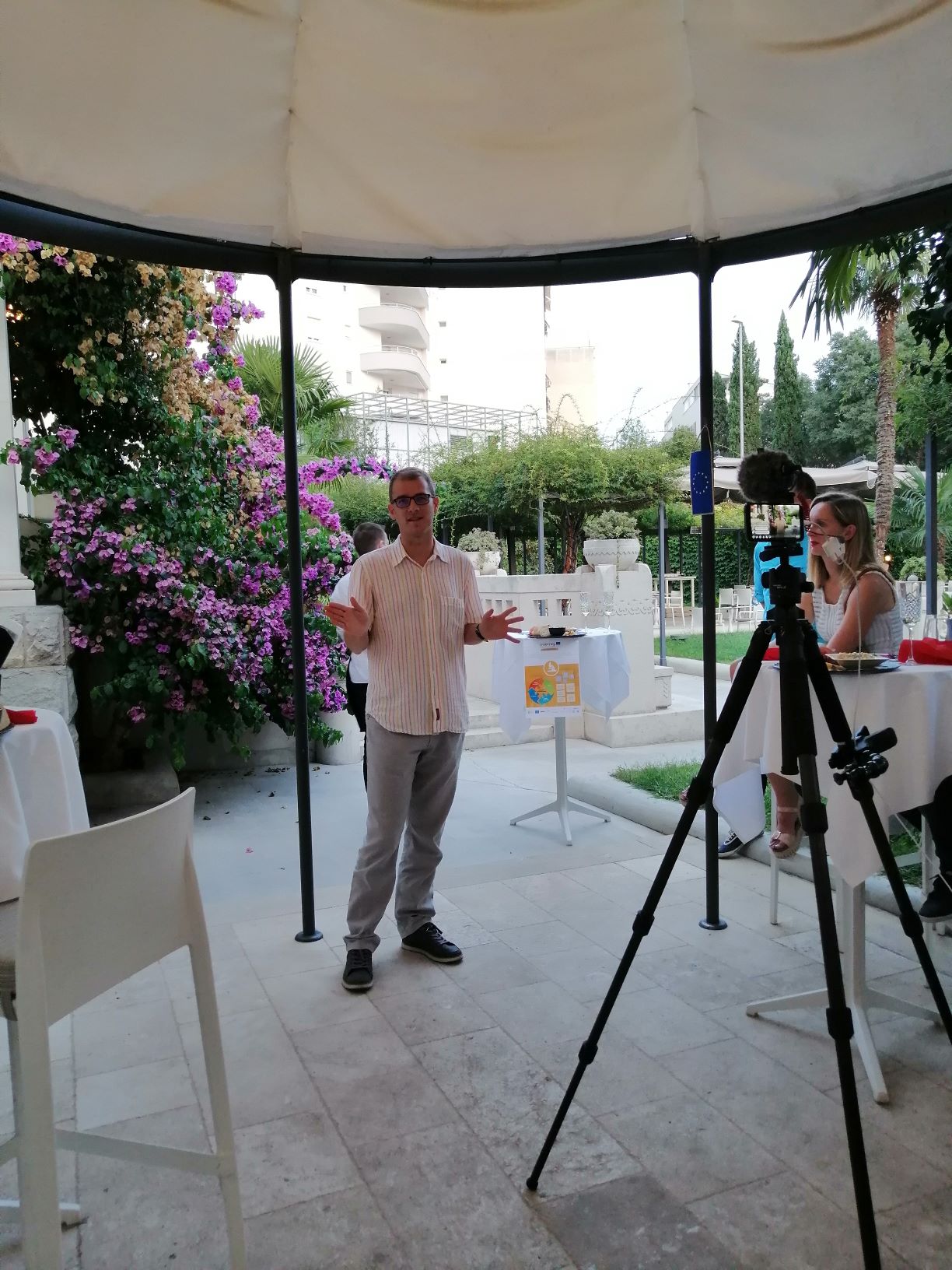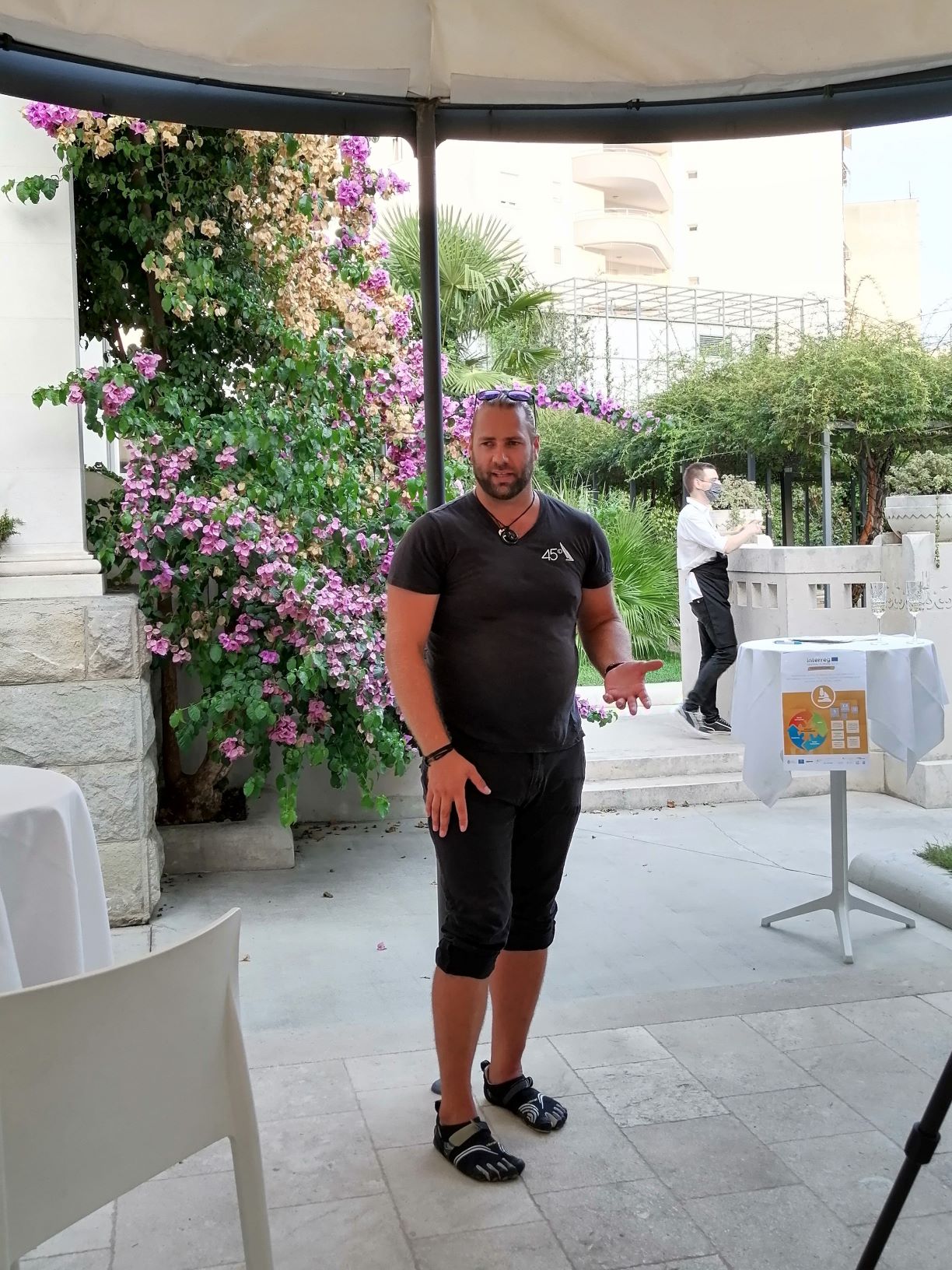One-Stop-Shop Opens in Split, Offering Support to Foreign Entrepreneurs
September 17, 2020 - A conference of the TASKFORCOME team was held on Wednesday evening to encourage the development of foreign entrepreneurship in the City of Split. A one-stop-shop is an initiative intended for facilitating the process of opening a business for future citizens of Split.
Opening your company in a new country is very challenging, especially in Croatia, because of its exhausting bureaucracy. Everyone who tried to start their business here is familiar with filling out tons of papers and knocking on thousands of doors to get an answer.
"We will try through this project to bring this whole process closer to you, to your friends or anyone who has some ideas about starting their own company, start-up, or becoming a social entrepreneur", Marin Urlić, from CEDRA Split, said.

Toni Jerković from the Service for International and EU Projects of the City of Split welcomed all gathered and explained that Split is not only a destination for rest and entertainment but can become the core of development and launching entrepreneurial ideas and ventures.
"We believe that Croatia, as part of the European Union, is developing and opening to foreigners that want to start their business here. In this project, the City of Split saw an opportunity to equip the now-abandoned space in the Multimedia Cultural Center (better known as the Youth Center) and open a one-stop-shop, and thus use the potential of empty public spaces for the benefit of not only immigrants but also the local population", he stressed.
Those interested will be able to get free advice and support in starting a business - from consulting tips for developing plans, strategies, and processes in their company to marketing, financial and other advice for the development of innovative products.
It is expected that the one-stop-shop will be equipped by the end of this year, and civil society organizations from the Youth Center Platform will also operate in that area.
Michael Freer, who moved from Great Britain to Split five years ago, shared his experience. He fell in love with the mountains, sea, and the climate and decided to stay. He used to work for CEDRA Split, but he left them for his own company, Ensoco. He wants to share the first-hand experience and help others with useful information when starting a business in a new environment where you know neither the language nor culture.
"Through this project, we want to help all foreigners from all countries from Bosnia and Herzegovina, Serbia, Albania, China, from EU member states. Those from BiH and Serbia, as well as from Russia, know the language, they can communicate here, but they need advice on starting a business. We want to create an ecosystem between local people and foreigners to show that Croatia is not just a place for a week or two vacation but a great place to live", Michael explained.
Besides Michael, Sarah Dyson from Expat in Croatia and Nick from 45 degrees sailing also shared their experiences.

For the latest travel info, bookmark our main travel info article, which is updated daily.
Read the Croatian Travel Update in your language - now available in 24 languages
Join the Total Croatia Travel INFO Viber community.
Growth of Optimism Among Foreign Companies in Croatia?
Doing business in Croatia in 2018 was rated as better by 72 percent of companies who partook in AmCham's research on the development of Croatia's business climate, a jump in comparison to just one year earlier, in which that figure stood at 65 percent. It appears that the image of doing business in Croatia is gradually improving in the eyes of the foreign business community and their companies.
As Poslovni Dnevnik/Darko Bicak writes on the 7th of March, 2019, the international business community is visibly more optimistic about the development of the business climate in the Republic of Croatia, yet the main challenge continues to be the difficulty in finding skilled labour and the functioning of the legal state, as was reflected in the results of an analysis of the American Chamber of Commerce in Croatia - AmCham. The aforementioned results were presented to the public on the 6th of March.
This is a relatively reliable sample because AmCham brings together 230 mostly very successful companies employing nearly 80,000 workers in Croatia alone. While this analysis is similar to that which was conduced by Croatian professional associations or foreign chambers and consultants, the specificity of AmCham's research is that American companies are mostly more global and more inclined to export markets than the Croatian average, and in that same scope, AmCham compares Croatia with countries in its ''region'' which covers a much wider geographic area than what is commonly referred to as "the region" in Croatian terms.
As explained by Andrea Doko Jelušić, the executive director of AmCham, every American, international, and ultimately Croatian company has its own definition of what the ''region'' actually refers to, and in AmCham's case it most often includes, along with the Adria region, central and eastern European countries such as Poland, Czech Republic, Hungary, Romania, and Bulgaria.
However, 130 members of the management of American, international and Croatian companies who partook in the AmCham research have reported a 72 percent increase in performance in 2018, compared to the previous year, during which it stood at a significantly lower 65 percent. At the same time, as many as 60 percent of them have increased their number of employees, which is more than encouraging.
As far as the business environment in Croatia over the last five years stands, respondents have assessed the main constraining factor in business to be lack of an adequate workforce, an unstable regulatory framework, and tax. The worst deterioration in the last five years is linked to the availability and the quality of the workforce, as well as the ''relaxed'' implementation of legal rules and procedures.
"The lack of an adequate workforce has appeared as a significant problem for the Croatian economy last year, and this year's survey rates it as the biggest obstacle to business in Croatia. At the same time, this is the area in which the worst deterioration has been seen," stated Andrea Doko Jelušić. On the other hand, the biggest improvements are visible in terms of financing, the demand for goods and services, and trading opportunities.
As many as 76 percent of the research's respondents see the impact of state administration on the business environment as either negative or to no particular effect, which, compared with last year, represents a 10 percent decrease. Most of AmCham's members, of which there are 68, also operate in other Central and Eastern European countries (SIEs), of which 65 percent operate in more than five countries in the region.
Only eight percent believe that the business conditions in Croatia are better than those in other SIE countries, while 45 percent believe that conditions in Croatia are worse than they are in other countries.
The biggest disadvantages of Croatia in relation to other countries relate to the small market and in the same threshold, the slow administration and the absence of a long-term government strategy. The main advantages Croatia boasts according to the respondents are the general advantages of the country's membership of the European Union, the tourism potential of the country, and its handy geostrategic position.
In the upcoming three year period, 81 percent of AmChama members are planning to expand their operations in Croatia, and 75 percent of them are planning on opening up new jobs.
Out of the total number of surveyed, as many as a quarter of them are planning to employ more than twenty new employees. On the other hand, seven percent of these companies expect to reduce the number of existing employees over the next three years.
The introduction of the euro into Croatia is seen as welcome by as many as 91 percent of AmCham's entrepreneurs who say it would have either a positive or neutral impact on their business. In last year's survey, 49 percent of respondents emphasised the possibility of using EU funds as the third major positive impact of Croatia's EU membership. However, just 11 percent of the companies involved stated that they were beneficiaries of EU funds that at the time of the conduction of this research.
Among the respondents, the greatest interest appears to lie in obtaining money from EU funds for projects in the field of Information Communication Technology (ICT), 36 percent, and for production projects, or 17 percent, along with related production facilities.
"The optimism of the business community in Croatia continues to be visible from the results of the survey this year," commented Berislav Horvat, Chairman of AmCham's Council of Managers.
Make sure to stay up to date with the business and investment climate in Croatia by following our dedicated business page.
Click here for the original article by Darko Bicak for Poslovni Dnevnik
From the Philippines to Croatia, Šibenik Wins Foreign Hearts
With all the negative news of people leaving in their droves, there are much quieter arrivals, too...
From America and Japan: Two Foreigners Settle in Croatia Satisfied
In a sea of depressing and paradoxical sagas about there not being enough job, high enough wages, and even situations in which establishments are forced to close due to a lack of staff, each and every positive story shines like a diamond among rocks.
Croatia's Foreign Entrepreneurs: Felix, from Chile Back to His Croatian Roots
June 13, 2018 - Continuing our look at foreign entrepreneurs trying to make it in Croatia, today we meet Felix who swapped Chile for his second home - Croatia.
Croatia's Foreign Entrepreneurs: Chloé and Yvan, from Bora Bora to Hvar
Continuing our series on Croatia's foreign entrepreneurs, a look to an extraordinary small business in Stari Grad on Hvar island on February 8, 2018
Croatia’s Foreign Entrepreneurs: Michael Freer, Social Enterprise Guru
February 8th 2018, continuing our look at Croatia’s foreign entrepreneurs, this week we introduce you to Michael Freer, a man bringing new ideas and a fresh perspective to local businesses and communities.
Croatia's Foreign Entrepreneurs: Meet Ronny Haesen from Belgium
Continuing our look at foreign entrepreneurs, this week we meet Ronny Haesen from Belgium.
Croatia's Foreign Entrepreneurs: Meet Robyn, from Sydney to Split
Continuing our Foreign Entrepreneurs series, today we meet the lovely Robyn Vulinovich from Sydney, Australia, who now lives in Split and has found success in her boutique travel agency - My Hidden Croatia.
Meet Croatia’s Foreign Entrepreneurs: Mirela from Romania
Welcome to the launch of our newest series ‘Meet Croatia’s Foreign Entrepreneurs’ where, every week, we will bring you a story of a foreign entrepreneur who has successfully managed to set up a business in The Beautiful Croatia. Hopefully, their tales of trials and tribulations will be a beacon of hope for others.


